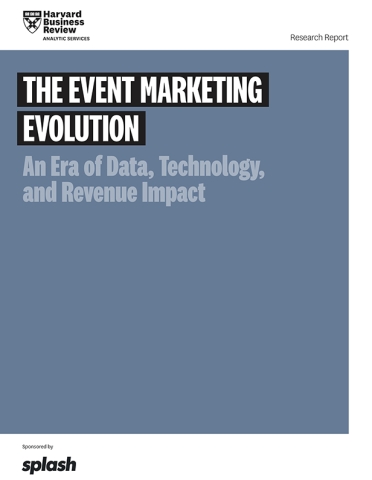New Research Demonstrates Correlation Between Events and ROI

Event marketing fuels rapid revenue growth for enterprise companies, according to a new study by Harvard Business Review Analytic Services and Splash, a New York City-based provider of end-to-end event marketing software.
Titled, “The Event Marketing Evolution: An Era of Data, Technology, and Revenue Impact,” the report confirms a new era for event marketers in which high-performing companies are investing more in event technology and accurately tying event activity to actual revenues or profits.
The study, which surveyed more than 700 enterprise executives and shares impactful insights on their event strategies, reveals more than 90 percent of companies prioritize hosting events for customers and potential customers, and that nearly as many prioritize sponsoring events.
In addition, high-growth companies (which have experienced 30 percent or more revenue growth over the past two years) are increasing their event investment more than others.
“More than ever before, it is crucial for businesses to go beyond the digital space to build meaningful relationships through human, in-person experiences,” said Ben Hindman, CEO of Splash. “However, measuring event ROI is challenging and until recently, it was nearly impossible.
He continued, “Now, with the growing investment in events and the maturation of end-to-end event technology, event marketers have the ability to report on much more than anecdotal results. The study confirms that high-performing companies are especially tapping into the marketing power of events and investing in technology that’s helping them measure the impact of their events down to actual revenue. We see these same trends at Splash in our own top-performing customers, who we refer to as Event Optimizers.”
With insights from 739 enterprise brands, 50 percent of which generate over $1 billion in revenue, the report features:
- The 26 most popular event types for B2B and B2C hosted and sponsored events
- Event budgets and staffing best practices for global brands
- The shift from sponsored to hosted events
- Strategies of the fastest-growing enterprise brands
- Top event metrics tracked and ROI challenges
- Customer stories from top performers in the business
According to the study, approximately 23 percent of companies say they are able to calculate ROI for events and exceed business goals. In addition to experiencing more than 30 percent revenue growth, what these businesses had in common is the investment in data-driven event technology, the ability to measure top and bottom funnel metrics, and a shift in strategy from sponsoring to hosting events.
“The best (technology) adopters are on average more likely to see business value from events and to consider themselves better positioned for future success,” Hindman added.
Survey respondents reported that their organizations host 73 events annually on average and sponsor another 62; respondents are also devoting significant resources to event marketing activities, with:
- One third hosting their own trade shows
- 51 percent employing between one and 10 full-time event planning and management employees
- 27 percent employing 11 or more full-time event planning and management employees
- One in 10 allocating more than half their marketing budget to events
- 30 percent allocating at least 20 percent of their marketing budget to events
- Four in 10 reporting that they'll spend more on hosting events in the year ahead
“Creating in-person business relationships through events is becoming more crucial than ever,” said Alex Clemente, managing director of Harvard Business Review Analytic Services.
He continued, “The study shows that, despite the prevalence of social media and digital growth-strategies, event investments are growing. This is corroborated by our survey respondents, which include senior marketing managers, who state that events drive more business value than other channels.”
In the report, Julie Hogan, global face-to-face marketing director for Facebook|Instagram, said she uses event marketing software that links to the company’s various CRM systems, a method that has been integral to improving the company’s event-measuring capabilities over the last two years.
“The face-to-face interactions that take place at events are incredibly powerful, and coming up with ways to measure the return on those interactions and our investments in those events is really incredible,” Hogan said.
She continued, “We’ve certainly become much more consistent in our ability not only to calculate a return on our investment but also to make our event team more productive, deliver a better customer experience and understand how we can do better in the future.”
To download “The Event Marketing Evolution: An Era of Data, Technology, and Revenue Impact,” go HERE.
Don’t miss any event news! Sign up for any (or all) of our e-newsletters HERE & engage with us on Twitter, Facebook, LinkedIn & Instagram!


Add new comment